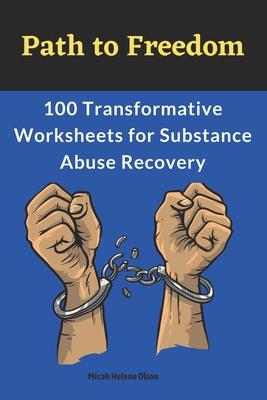"Path to Freedom: 100 Transformative Worksheets for Substance Abuse Recovery" offers a collection of transformative worksheets meticulously designed to guide individuals through the process of substance abuse recovery. Grounded in evidence-based practices and therapeutic techniques.
Key Highlights:
- Effective coping strategies: Learn practical techniques to cope with triggers, cravings, and stressors commonly encountered during substance abuse recovery.
- Practical worksheets: Engage in structured activities and exercises designed to promote self-reflection, goal-setting, and accountability throughout the recovery process.
- Cognitive-behavioral techniques: Explore evidence-based strategies for identifying and challenging negative thought patterns, fostering positive cognitive habits, and promoting lasting behavioral change.
- Relapse prevention strategies: Develop personalized plans to prevent relapse and maintain long-term sobriety by recognizing triggers, implementing coping skills, and building a support network.
- Managing triggers and cravings: Utilize worksheets specifically tailored to manage triggers and cravings, empowering individuals to navigate challenging situations and maintain sobriety.
- Self-reflection exercises: Engage in introspective activities to enhance self-awareness, explore underlying emotions and motivations, and facilitate personal growth in recovery.
- Goal-setting worksheets: Set clear and achievable goals for addiction rehabilitation, track progress, and stay motivated on the path to recovery.
- Coping skills worksheets: Acquire practical coping skills to manage stress, regulate emotions, and overcome substance use disorder, promoting resilience and well-being.
- Empowering tools: Access empowering resources and tools to overcome addiction, build self-efficacy, and cultivate a sense of empowerment in recovery.
- Developing healthy habits: Establish routines, incorporate healthy activities, and foster lifestyle changes to support long-term recovery and overall well-being.
- Mindfulness exercises: Practice mindfulness techniques to increase present-moment awareness, reduce impulsivity, and enhance coping abilities in substance abuse recovery.
- Addressing underlying issues: Explore and address underlying issues contributing to substance abuse, such as trauma, co-occurring mental health disorders, and maladaptive coping mechanisms.
- Comprehensive relapse prevention plans: Create comprehensive plans to identify triggers, implement coping strategies, and navigate high-risk situations to prevent relapse and sustain sobriety.
- Practical scenarios: Navigate real-life scenarios and challenges commonly encountered during addiction recovery, applying learned strategies and skills in practical settings.
- Coping strategies for stress management: Learn effective stress management techniques to reduce stress, promote relaxation, and enhance overall well-being in sobriety.
- Identifying and challenging negative thoughts: Identify and challenge negative thought patterns and beliefs that contribute to substance abuse, fostering cognitive restructuring and positive thinking.
- Assertiveness training exercises: Develop assertiveness skills to communicate effectively, set boundaries, and navigate interpersonal relationships in addiction rehabilitation.
- Building resilience: Build resilience and coping skills to overcome setbacks, adapt to challenges, and thrive in recovery from substance abuse.
- Rebuilding relationships: Use worksheets to repair and rebuild relationships damaged by substance abuse, fostering trust, communication, and connection in sobriety.
- Self-care practices: Prioritize self-care and wellness through activities that nurture physical, emotional, and spiritual health, promoting overall well-being and sustained sobriety.
